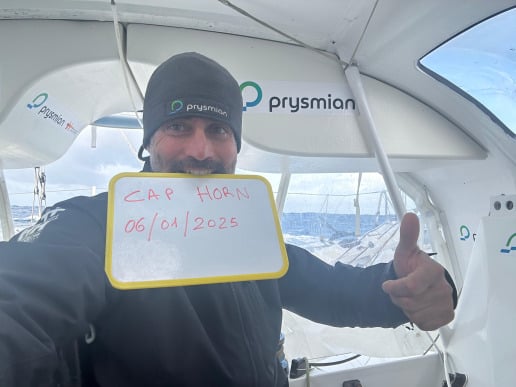Cape Horn: take two for Giancarlo Pedote!
On the 56th day of racing in the Vendée Globe, Giancarlo Pedote rounded the legendary Cape Horn at 10:10 UTC. This symbolic passage, the second in his sailing career following on from his first experience some four years ago, represents a key stage in his circumnavigation of the globe. Amidst demanding conditions, crucial strategic decisions and technical woes, the skipper of Prysmian is tackling the next step in his adventure with great perceptiveness and determination as he prepares to take on the challenges imposed by his climb up the Atlantic Ocean.
Rounding Cape Horn is a symbolic moment for any sailor undertaking a circumnavigation of the globe. Indeed, it heralds the exit from the turbulent waters of the Deep South and the start of the slog up the Atlantic Ocean. For Giancarlo Pedote however, this key stage was negotiated in conditions that were far from ideal. “I haven’t seen land yet and, contrary to four years ago, it’s possible that I won’t get a glimpse of it at all this time. The most important thing is that I’ve passed it though.” The night before his rounding proved to be rather tumultuous with squalls and violent winds, which made life rather trying. “Contrary to some of my rivals ahead of me, who rounded the cape in perfection conditions with just ten knots of breeze and calm seas, it wasn’t a great time for relaxation or an opportunity for me to relish the moment. Luck wasn’t on my side and I ended up in much rougher seas again.”
Prudence at the service of strategy
Faced with these difficult conditions, Giancarlo Pedote exercised caution by slowing the boat down in order to further preserve it in what were already harsh conditions. “I made the decision to ease off the pace before Tierra del Fuego to let the worst weather roll through because it wouldn’t have been very wise to get pummelled by 45-50-knot gusts on a boat that has already suffered a bit.” This considered choice is a reflection of the experience the sailor has racked up over the years. Indeed, the Italian knows that at critical moments, slowing up can be wiser than trying to force your hand. “You have to know when the moment’s right to push and when it’s better to stall for a while. I think it would have been utterly foolhardy to rush things and go headlong into the teeth of a storm. I have absolutely no regrets about the decision.” In essence, this measured approach enabled him to preserve his IMOCA and prepare as best he can for what promises to be a demanding climb up the Atlantic.
Climbing northwards with the utmost vigilance
With Cape Horn behind him, the Italian sailor is now focusing on the last section of the race, which will doubtless be the most strategic. “The Deep South was far from simple. I hope the next stage will go well but there is a big depression forming along the length of the Andes mountain range, which is likely to stir things up from Thursday onwards. I hope we’ll be much further north at that point otherwise it’s going to be really full-on!” warned the sailor. This zone of low atmospheric pressure threatening to serve up some tough sailing conditions will likely require increased vigilance from all the skippers still in the area. “We won’t have time for a breather or a gentle, quiet climb northward. As a result, we’ll have to really stay on our guard as conditions are going to be heavy.”
Holding course despite the technical challenges
In addition to the challenges presented by the weather conditions, Giancarlo Pedote is also having to deal with some persistent technical woes. The rudder, a key element of his boat, still needs to be repaired. “I’m going to take another closer look at my rudder lock as soon as possible. I need to replace a part of the appendage and think about the best way to optimise the whole thing to make it as reliable as possible.” This vital work comes on top of what is already a long list of concerns. However, as he prepares to take on the final phase of his round the world, the Florentine is demonstrating incredible lucidity, well aware that the Vendée Globe is much more than just a competition: it is a battle against the elements, the technical vagaries and one’s own limits.



